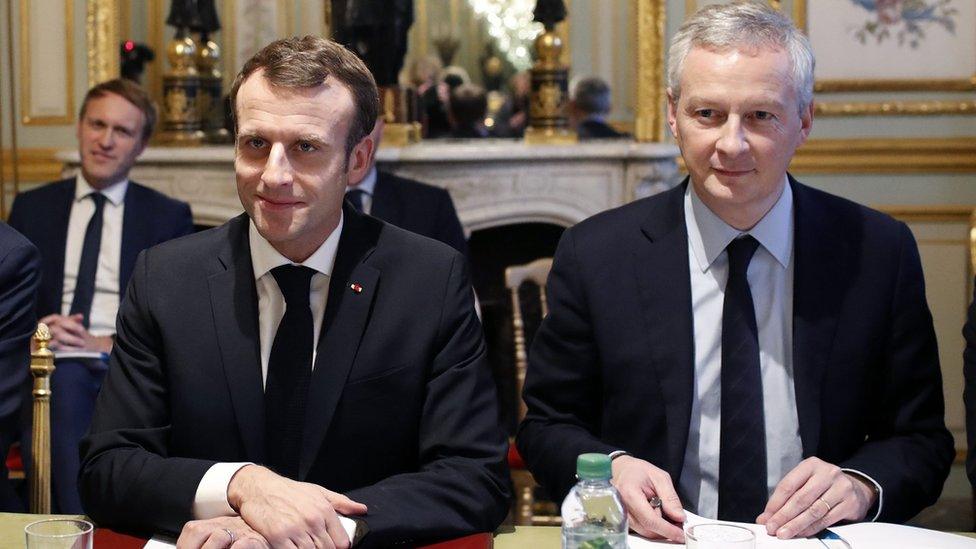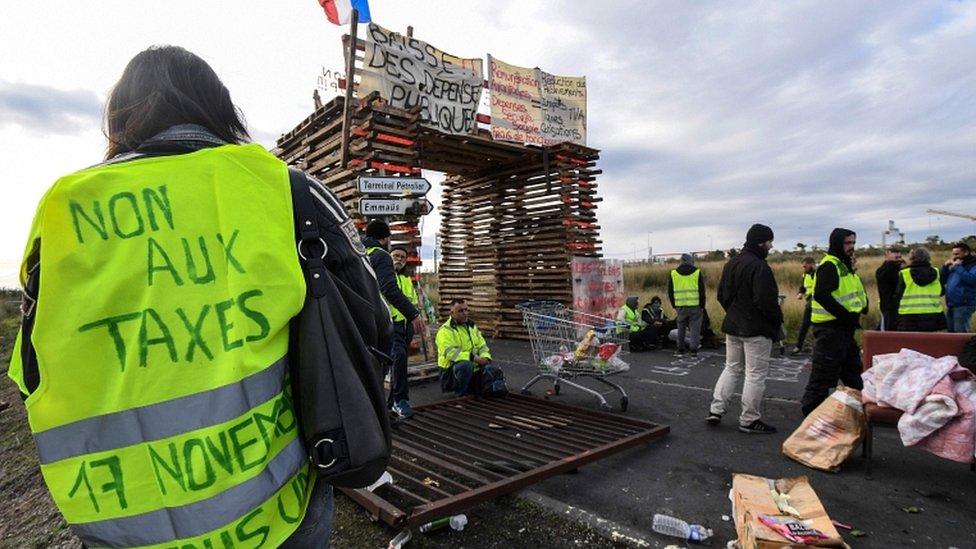France 'Gilets Jaunes': Spending cuts to fund Macron concessions
- Published

Bruno Le Maire (R) insisted France aimed to meet its European Union budget commitments
Measures to defuse France's yellow-vest protests will cost €10bn (£9bn; $11bn), says Finance Minister Bruno Le Maire.
That money will be offset by cuts in other government spending, he says.
Mr Le Maire, speaking a day after President Emmanuel Macron outlined the changes on TV, said planned reforms remained on course despite the concessions to protesters.
France would still honour deficit-to-GDP targets set by the EU, he told British and American journalists.
"France's attractiveness (for investors) is at stake. That is why it is so important to maintain the path of reform," he said.
"We want to stick to our European commitments. We will do our best to reduce the level of public spending and be as close as possible to 3% in 2019."
Italy, under pressure from Brussels to cut its budget, has already warned the European Commission not to give France any special favours.
Mr Macron announced four new measures on Monday evening aimed at buying off protesters, whose four-week movement has created the biggest crisis of his presidency.
An increase in a government bonus scheme for the low-paid, so that those on the minimum wage earn €100 euros more a month
An end to taxes and charges on overtime
Removal of a surcharge on most pensions
Encouraging businesses to make a tax-free bonus to staff
Where savings will be made
Mr Le Maire said the president had "found the right words and the right answer".
"If you see the polls, there is clear evidence that he's been understood by a large part of the population," he said.
President Macron says he is 'partly responsible' for the 'insufficient response' to the yellow vest protests
"It was necessary to bring the social crisis to an end. It was having an impact on growth - on SMEs in particular. We had to get out the message that we understood."
With the extra spending expected to cost around 0.5% of GDP, government officials said savings would be found in state administration, aid to businesses, and in new taxes on digital multinationals such as Google, Apple, Facebook and Amazon, collectively labelled "Gafa".
France's government has said it will bring in a so-called "Gafa" tax on its own, if it cannot be agreed inside the EU.
The French government had budgeted for a 2.8% deficit-to-GDP ratio in 2019. Without any savings, the new measures would mean that ratio climbing to 3.3%.
To stay within EU stability rules, any increase above 3% would need to be offset by cuts.
However, government officials noted that the 2019 figures were skewed because of a one-off double pay-out to businesses, linked to the lowering of social charges. Without that exceptional expenditure, they say France would be well below the 3% target.
'Make work pay'
The minister said the yellow-vest protests were symptomatic of a Europe-wide malaise caused by low wages.
"The key thing is to make work pay. What we are seeing is a huge number of citizens who are in work but still failing to make ends meet. It is a problem of all our societies - the dignity of work.
"The critical thing is to find the right balance between a clear response to the fears of a large part of our population, and the need to keep on the path of reform."
Mr Le Maire insisted that reforms to the pension system and to unemployment benefit would go ahead as planned next year.
He defended President Macron's decision not to give in to a key demand of the protesters, to rescind the partial repeal of the wealth tax (ISF).
After his election last year, President Macron abolished a tax on high-earners' share dividends but kept it on investment in property. The aim was to encourage the rich to keep their money in France and invest in industry, but opponents see it as a symbol of divided society.
"If we want to re-industralise we need capital," said Mr Le Maire.
"Investors have come. Foreign investment has never been so high. We have indications that our fiscal policy has made the country more attractive."
- Published6 December 2018

- Published11 December 2018
